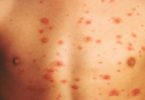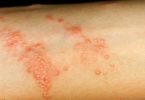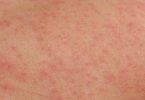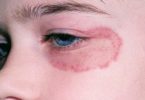What's in this article?
Herpetic stomatitis is a viral infection of the mouth that causes ulcers and inflammation. These mouth ulcers are not the same as canker sores, which are caused by a different virus.
Mouth sores generally don’t last longer than two weeks, even without treatment. If a cause can be identified, your doctor may be able to treat it. If a cause cannot be identified, the focus of treatment shifts to symptom relief.
Alternative Names
Stomatitis – herpetic
Prevention
Approximately 90% of the population carries herpes simplex virus. It is difficult to prevent children from picking up the virus at some time during their childhood.Children should strictly avoid close contact with people who have cold sores (for example, no kissing parents who have active cold sores). Children should also avoid other children with herpetic stomatitis. They should not share utensils, glasses, or food with actively infected people.
Symptoms of Herpetic stomatitis
- Blisters in the mouth, often on the tongue, cheeks, palate, gums, and a border between the lip (red colored) and the normal skin next to it
- Decrease in food intake, even if the patient is hungry
- Difficulty swallowing (dysphagia)
- Drooling
- Fever (often as high as 104 °Fahrenheit) may occur 1 – 2 days before blisters and ulcers appear
- Irritability
- Pain in mouth
- Swollen gums
- Ulcers in the mouth, often on the tongue or cheeks — these form after the blisters pop
Causes, incidence, and risk factors
Herpetic stomatitis is a contagious viral illness caused by Herpes virus hominis (also herpes simplex virus, HSV). It is seen mainly in young children. This condition is probably a child’s first exposure to the herpes virus.
Treatment of Herpetic stomatitis
Treatment involves:
- Acyclovir, which fights the virus causing the infection
- A mostly liquid diet of cool/cold nonacidic drinks
- Numbing medicine (viscous lidocaine) applied to the mouth if there is severe pain
Lidocaine must be used with care because it can kill all feeling in the mouth. This may interfere with swallowing, and may lead to burns in the mouth or throat, or choking. There have been rare reports of death from overdose or misuse of lidocaine.
Possible Complications
Herpetic keratoconjunctivitis, a secondary herpes infection in the eye, may develop. This is an emergency and can lead to blindness. Dehydration may develop if the child refuses to eat and drink enough because of a sore mouth.







